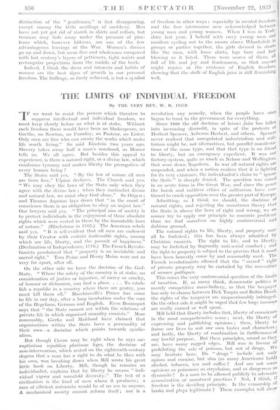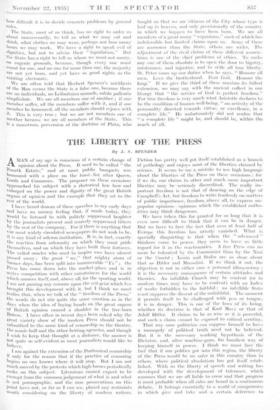THE LIMITS OF INDIVIDUAL FREEDOM
By THE VERY REV. W. R. INGE
. `11rF we want to resist the powers which threaten to 1. suppress intellectual and individual freedom, we Must keep clearly before us what is at stake. Without such freedom there would have been no Shakespeare, no Goethe, no Newton, no Faraday, no Pasteur, no Lister. Only men are free who can create the works which make life worth living." So said Einstein two years ago. Slavery takes away half a man's manhood, as Homer tells us. We all agree. But besides this appeal to experience, is there a natural right, or a divine law, which condemns tyranny and makes liberty the prerogative of every human being ?
The:Stoics said yes. 't By the law of nature all men are born free," Ulpian declares. The Church said yes. " We may obey the laws of the State only when they agree with the divine law ; when they contradict divine and natural law, we must obey God alone." So Origen ; and Thomas Aquinas lays down that " in the court of conscience there is no obligation to obey an unjust law." Our lawyers said yes. " The principal aim of society is to protect individuals in the enjoyment of those absolute rights which were vested in them by the immutable laws of nature." (Blackstone in 1765.) The American rebels said yes. " It is self-evident that all men are endowed by their Creator with certain inalienable rights, among which arc life, liberty, and the pursuit of happiness." (Declaration of Independence, 1776.) The French Revolu- tionists proclaimed that " property is an inviolable and sacred right." Tom Paine and Henry Maine were not so very far apart, after all. • On the other side we have the doctrine of the God- . State. " Where the safety of the country is at stake, no consideration of justice or injustice, of mercy or cruelty, of honour or dishonour, can find a place. . . To estab- lish a republic in a country where there are gentry, you must kill them all." Macchiavelli's Prince has come to life in our day, after a long incubation under the care of the Hegelians, German and English. Even Bosanquet says that " the State cannot act within the relations of private life in which organised morality consists." More reasonably, Gierke and Maitland have claimed that organisations within the State have a personality of their own—a• doctrine which points towards syndic- alism.
But though Cicero may be right when he says car- ruptissima republica plurintae loges, the doctrine of non-intervention, which rested on the eighteenth-century dogma that a man has a right to do what he likes with his own, was breaking down when Mill wrote his great little book on Liberty. Mill, , thoiigh he remains an individualist, explains that by liberty he means indi- vidual " vigour and manifold diversity." The test, of a civilisation is the kind of men whom it produces ;. a race of efficient automata would be of no use to anyone. A mechanised society cannot reform itself; nor is a revolution any remedy, when the people have once begun to trust to the government for everything.
Since 1880 the old doctrine of laissez ,faire has 11110 into increasing discredit, in spite of the protests of Herbert Spencer, Auberon Herbert, and others. Spencer never realised that unregulated industrialism and mill' tarism might be, not 'alternatives, but parallel manifesta- tions of the same type, and that that type is no friend to liberty, but an emergency expedient. It was our factory-system, quite as much as Nelson and Wellington, that wore down Napoleon. In war all natural rights are suspended, and when a nation realises that it is fighting for its very existence, the individualist's claim to " ignore the State " is sharply denied. The question was raised in an acute form in the Great War, and since the peace the harsh and ruthless ethics of militarism have con- tinued to crush opposition over the greater part of Europp Admitting, as I think we should, the doctrine of natural rights, and rejecting the monstrous theory that the State is above the laws of right and wrong, we no sooner try to apply our principle to concrete problems than we find ourselves on highly controversial and dubious ground.
The natural rights to life, liberty, and property maY all be forfeited ; this has been always admitted 11 Christian casuists. The right to life,, and to. liberty, may be forfeited by flagrantly anti-social conduct ; and the right to property is subject to the proviso that it must have been honestly come by and reasonably used. The French revolutionists allowed that the " sacred " right of private property may be curtailed by the necessities of secours publiques. This raises the very controversial question of the limits of taxation. If, as many think, democratic politics is merely competitive mass-bribery, so that the taxpayer has only to choose between Dick Turpin and Robin Hood, the rights of the taxpayer are unquestionably infringed. On the other side it might be urged that few large incomes are really earned or well spent. Mill held that liberty includes first, liberty of conscience in the most comprehensive sense ; next, the liberty of expressing. and publishing opinions ; then, liberty to frame our lives to suit our own tastes and characters ; and lastly, the liberty of combination in furtherance of any lawful purpoSe. , But these principles, sound as they are, have many ragged edges. Mill was in favour of prohibiting the sale of ,poisons, but not of drugs. We may hesitate 'here. 'Do " drugs " include ' not only opium and cocaine, but also (as many Americans hold) alcohol, tobacco, tea and coffee ? And are not some opinions as poisonons as strychnine, and as dangerous us dynamite? Is a man to be allowed publicly to advocate assassination or unnatural practices ? Not, I think, if freedom is the deciding principle. Is 'the' censorship of books and plays legitimate ? These examples will shoiY ' how difficult it is to decide concrete problems by general rules. The State, most of us think, has no right to order us • about unnecessarily, to tell us what we may • cat and drink, what clothes we may wear, perhaps not hoW many hours we may work. We have a right to speak evil of dignities, but not to advise their " liquidation." But the State has a right to tell us whom we must not marry. on eugenic grounds, because, though every one must Count for one, and no one for more than one, the majority are not yet born, and yet have as good rights as the existing electorate. We are often told that Herbert Spencer's antithesis of the Man versus the State is a false one, because there are no individuals, no Leibnitzian monads, solida pollentia 6'iPzplicitate. We are all members one of another ; if one member suffer, all the members suffer with it, and if one member be honoured, all the members should rejoice with t. This is very true ; but we are 'hot members one of another because we are all members of the State. This is a monstrous perversion of the doctrine of Plato, who taught us that we are citizens of the City whose type is laid up in heaven, and only provisionally of the country in which we happen to have been born. We are all members of a great many " organisms," each of which has indefeasible but limited claims upon us. Some of these are narrower than the State, others are wider. The ndjustinent of the rival claims of these different associa - Cons is one of the chief problems of ethics. To make any one of them absolute is to open the, door to bigotry, intolerance, and injustice, and to stifle all true liberty. St. Peter sums up our duties when he says, " Honour all men. Love the brotherhood. Fear God. Honour the king." If we give the third of these maxims its fullest extension, we may say- with the ancient collect in our liturgy that " the service of (god is . perfect freedom." For true freedom is very much what Aristotle declares to be the condition of human well-being. " activity of the personality directed towards virtue, or excellence, in a complete life." He unfortunately did not realise that " a complete life " might be, and should be, within the reach of all.































































































 Previous page
Previous page